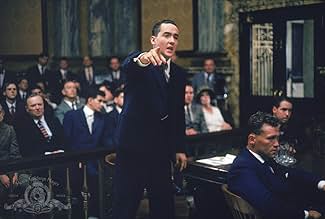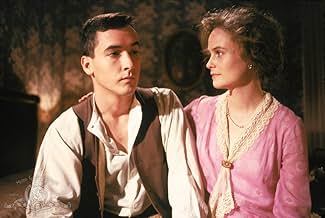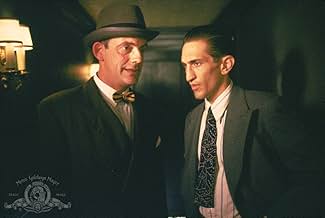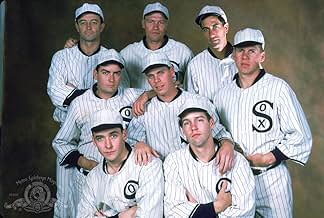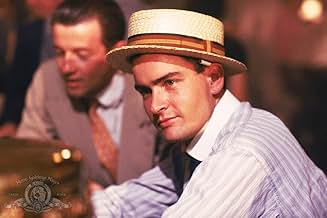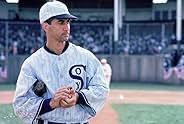A dramatization of the Black Sox scandal when the underpaid Chicago White Sox accepted bribes to deliberately lose the 1919 World Series.A dramatization of the Black Sox scandal when the underpaid Chicago White Sox accepted bribes to deliberately lose the 1919 World Series.A dramatization of the Black Sox scandal when the underpaid Chicago White Sox accepted bribes to deliberately lose the 1919 World Series.
- Awards
- 2 nominations total
- Smitty - The Writers
- (as Jim Desmond)
- Director
- Writers
- All cast & crew
- Production, box office & more at IMDbPro
Featured reviews
If you forgive the fact the film has to simplify certain aspects of the conspiracy in order to make the film easier to digest, then you will find that Eight Men Out is a worthy film and in the category of "baseball movies" it's one of the best.
There are anachronisms in the film here and there, the worst of which is Buck Weaver's question asking which of the lawyers was the "Babe Ruth" of law. Sure Babe Ruth was coming into his own by 1920, but most ballplayers in that era would not have place Ruth in the class of Cobb, Tris Speaker or Walter Johnson. For baseball fans, this line in particular really comes off as shallow, especially since the rest of the film really tries to capture the "dead-ball" era. For the most part though, this film feels and sounds a lot like America right after World War I ends, a fascinating time and place.
Studs Terkel steals the show in my estimation. His character in the film is not far from whom he is in real life and his authenticity is undeniable. John Sayles is a little stiff by comparison and his singing in the railway car (which according to legend did actually happen), is rather difficult to bear. None the less, his direction makes up for his foibles as an actor.
Straitharn is another gem in this movie, and once again this actor seems to get right to the soul of the characters he is given to play. Eddie Cicotte's dilemmas are written all over Straitharn's face in every scene, he's also given some of the best dialog in the film. Cusack plays his part well, despite the fact that many of his scenes are reduced to clichés. Cusack's best moments are when he is frustrated about his inclusion in the conspiracy trial, despite the fact he gave his all to try and win the series. His outbursts in the courtroom seem perfect, as if drawn from the trial transcripts themselves.
Joe Jackson is given unfair treatment. If "Field of Dreams" mythologizes Jackson to point of hyperbole, "Eight Men Out" plays up his illiteracy with too much of a heavy hand. Joe Jackson wasn't stupid, indeed if you read his last major interview before he died, he speaks about the "Black Sox" with great alacrity and clarity. He was not as ignorant as this film would have you believe. One day someone will produce a film about Joe Jackson, that will portray him accurately, but Eight Men Out is not that film.
Although their roles are very minor, Kid Gleason and Ray Schalk are really well played and written. These two went through a very difficult time during the series, and this is well demonstrated. One minor beef is that Nemo Leibold, Shano Collins and other players outside of the conspiracy are never touched upon at all. This is understandable to a degree given the relatively short length of the film, despite the complexity of the subject matter.
The baseball scenes themselves are well done. The bats, balls, gloves and uniforms look like the equipment of that era and the ballparks are successful mock ups for the most part. There are even a couple of nifty athletic displays in the outfield that must have taken several takes to pull off.
Overall, this is my second favorite baseball movie, next to "Bull Durham". Its a little light on some of the details of the conspiracy, but it makes up for it in other areas. It has some great music, some great sets, some solid acting and overall seems genuine and fair to all the major players in the conspiracy.
Eight Men Out isn't perfect, but it isn't as flawed as Roger Ebert would have you believe. If you a fan of baseball in fact, I'd say its mandatory viewing.
The rest of the movie is pretty good too, although I sometimes get the characters and their motives a little mixed up. The baseball scenes are very well done. I say this, being no big fan of the sport myself. Charlie Sheen (a true aficionado) looks like he's heaving a heavy bat as he clunks out a hit, not a rubber prop. I admired too the way the series games swung back and forth as the players on the take tried to figure out if they were playing for the money or for themselves. It's tough to throw a game because part of one's self always wants to do what one does best -- in this case, play baseball well. The German ethologists call it "Funktionslust." In the end, despite some indecision, they do however lose.
The movie isn't kind to the gamblers or to the owners. Comisky was incredibly cheap and greedy. The script gives this as one of the reasons why the players agreed to throw the game. As Strathairn says when someone offers him a part payment, "I don't care about the money." He's throwing the games to foul up Comisky who has just denied him a promised bonus because Strathairn, playing the pitcher Cicotte, has only played 29 games instead of the 30 they'd agreed upon. Comisky has made him sit on the bench for the last few games so he wouldn't cross the bonus threshold. (Question: Given that Comisky cheated Cicotte of the contracted bonus, was Cicotte morally justified in throwing the games?)
The movie isn't nice to the gamblers either. Not only don't they pay off but they treat the players with contempt. Arnold Rothstein ("A.R.") treats EVERYBODY rudely. He never says hello when he enters a room, never says good-bye when leaving, and never smiles.
I kind of liked this. Sayles may not be a master but his films are always highly individualized. I cannot visualize him directing "Die Hard With A Sardonic Grin."
Sports movies are never easy to do and making one that reaches beyond the bounds of sports fans is especially challenging. While `Eight Men Out' may not quite grab the non-sports enthusiast as well as `Field of Dreams,' `Hoosiers' or `A League of Their Own,' (my own nominations for the three best sports-related movies of all-time), it DOES more than hold its own among the top third of the ever-growing list of baseball movies.
This is largely because it is not really a BASEBALL movie. Like the aforementioned films, it is a movie about people who happen to PLAY baseball. Based on the Eliot Asinof novel, the movie is, by and large, historically accurate. It also seems to be fairly even-handed in dishing out guilt. Yes, the players played for skinflint Charles `Old Roman' Comiskey, yes they were easy prey for the gambling element, yes they were lacking in education and common sense yet they are not portrayed as innocent victims, either.
I have been a huge David Strathairn fan ever since `Eight Men Out.' His sensitive portrayal of star pitcher Eddie Cicotte was pivotal to the movie's success. Asinof correctly focused on Cicotte as the pivotal figure in the World Series fix. `Eddie's the key!' more than one character exclaimed. Other players, approached with the idea of throwing the series, reacted with shock when finding out the highly-respected Cicotte was involved. This was certainly no easy choice for Cicotte, a man of some integrity and conscience, but a pitcher nearing the end of his salad days and a man bitter at his mistreatment by Comiskey. Strathairn plays the intelligent, stressed character under the gun as well as any actor of his generation.
The rest of the cast is fine, too, with despicable Chick Gandil (Michael Rooker) and Swede Risberg (Don Harvey) playing the odds and pressuring teammates to go along. James Read is excellent as henpecked southern pitcher Claude `Lefty' Williams, probably the second most respected player on the team. Of course Buck Weaver (John Cusack) is a huge figure, considering the gamblers' pitch, then opting to pass when the money isn't immediately forthcoming.
The movie isn't shy about its version of good guys & bad guys. Gandil, Risberg & Swede's buddy Fred McMullin (Perry Lang) are the villains, while Williams, Weaver, Joe Jackson (D.B. Sweeney) and Manager Kid Gleason (John Mahoney) are victims. Hall of Famer Eddie Collins (Bill Irwin) and no-nonsense catcher (and controversial Hall of Famer) Ray Schalk (Gordon Clapp) are frustrated on-lookers, while Dickie Kerr (Jace Alexander) is the wide-eyed & naïve rookie. All turn in fine work and I find myself loving the taciturn Schalk, the kind of catcher every manager wants. Most interesting is the movie's portrayal of Shoeless Joe, who is interpreted as being mildly retarded, rather than just illiterate.
The baseball scenes are quite realistic, as are the ballpark backdrops. I first saw it the year after visiting Old Comiskey Park (the year before it was torn down) and felt right at home on the movie set even the turnstiles looked authentic.
In closing, I can't honestly say that someone with NO knowledge or interest in baseball would flip over this film. Yet, one doesn't have to be a bleacher bum to enjoy it and not knowing the outcome may actually make it MORE fun for the neophyte! Overall, a fine movie.
Did you know
- TriviaIn many scenes, players toss their gloves down on the field near their positions before they head to the dugout. Until the 1950s, players frequently left their gloves on the field while at bat. Because of the danger of players stepping on or tripping on them, and batted or thrown balls bouncing off them in odd directions, Major League Baseball requested, then demanded, players to take their gloves with them to the dugout. They finally complied after a rule change and fines.
- GoofsShoeless Joe Jackson signs his confession with an "X". Jackson was illiterate, but he could sign his name by mimicking a pattern. Autographed baseballs and photographs from the time prove it.
- Quotes
Buck Weaver: I still get such a bang out of it. Playin' ball. Same as I did when I first come up. You get out there, and the stands are full, and everybody's cheerin'. It's like everybody in the world come to see you. Inside that, there's the players, and they're yakkin' it up. The pitcher throws, and you look for that pill, and suddenly, there's nothin' else in the ballpark but you and it. Sometimes, when you're feelin' right, there's a groove there, and the bat just eases into it and meets that ball. And when that bat meets that ball, and you can just feel that ball just give, and you know it's gonna go a long way, damn, if you don't feel like you're gonna live forever. I couldn't give that up. Not for nothin'.
- Crazy creditsThe opening credits are done against a cloudy blue sky, first going up, then to the right, and down to the bottom (kind of like a fly ball). Despite the ensemble cast, the most well-known leading and character actors at the time are credited first in alphabetical order, then lesser known actors that had roles that were just as large or larger are credited in pairs of two. Example: John Cusack, Christopher Lloyd, and Charlie Sheen are credited first, due to their successes with The Sure Thing (1985), Back to the Future (1985), and Platoon (1986), respectively; however, in pairs, Michael Rooker, Kevin Tighe, and Richard Edson also had pivotal roles, but were lesser known. Sheen already was well-established but had only a few minutes of screen time in the movie, Lloyd and Edson always are together, playing gamblers, but Lloyd was a much more well-known actor and credited first.
- Alternate versionsFive seconds were cut from the British theatrical release in order to obtain a "PG" rating by removing a use of strong language. The film was later released uncut on video and the rating was upgraded to "15", which was subsequently downgraded to "12" for the DVD.
- SoundtracksI'm Forever Blowing Bubbles
Written by Jaan Kenbrovin (as Jann Kenbrovin) and John W. Kellette (as John William Kellette)
Published by Warner Bros. Music, a division of Warner Bros. Inc.
Used by permission. All rights reserved.
- How long is Eight Men Out?Powered by Alexa
Details
Box office
- Budget
- $6,100,000 (estimated)
- Gross US & Canada
- $5,680,515
- Opening weekend US & Canada
- $1,129,491
- Sep 5, 1988
- Gross worldwide
- $5,680,515
Contribute to this page





